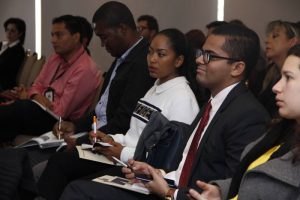
13/06/2018
The ACTUE-Colombia project has supported the Open Regional Government strategy in order to promote transparency and access to information
Starting from the premise that preventing and fighting corruption must take place both at the national and regional levels, the European Union Anti-Corruption and Transparency Project for Colombia (ACTUE-Colombia) has provided assistance to Colombian institutions in implementing key measures for Open Regional Government.
The project is financed by the European Union and managed by FIIAPP in coordination with the Secretary for Transparency (ST) and Public Function (FP). It has assisted three regional governments, six city councils and two hospitals in areas such as applying the Law on Transparency and Access to Public Information, drafting Anti-Corruption and Citizen Information Plans (PAAC), fostering accountability and promoting public participation.
It has therefore contributed to helping officials to understand that the right to transparency and access to information is an essential right for being able to exercise other rights. It has increased their awareness by institutionalising advances in active transparency and their knowledge of how to identify and manage the risks of corruption.
The Open Regional Government strategy forms part of the ACTUE-Colombia project, which, in its closing ceremony, presented some lessons learned and recommendations. The closing ceremony was attended by representatives of all the departments and municipalities assisted, the director of the Department of Public Function, Liliana Caballero, the secretary for Transparency, Gabriel Cifuentes, and Matilde Ceravolo and Tito Contreras, representing the European Union delegation to Colombia.
 Among the challenges, in addition to the sustainability of the actions following the aid from international cooperation, are feedback on the lessons learned in the regions about the national tools and a perception of public participation as an instrument for allowing the public to take part in decision-making. It is therefore important to create a feeling of co-responsibility. Gabriel Cifuentes, Secretary for Transparency, therefore highlighted the need to collect the experiences that must be provided by the regional governments and municipalities “as an exercise in abandoning the culture of opacity” and a dialogue in which the public and civil society can be included on building public policy.
Among the challenges, in addition to the sustainability of the actions following the aid from international cooperation, are feedback on the lessons learned in the regions about the national tools and a perception of public participation as an instrument for allowing the public to take part in decision-making. It is therefore important to create a feeling of co-responsibility. Gabriel Cifuentes, Secretary for Transparency, therefore highlighted the need to collect the experiences that must be provided by the regional governments and municipalities “as an exercise in abandoning the culture of opacity” and a dialogue in which the public and civil society can be included on building public policy.
In addition, it is still necessary to “humanise information” so as to organise it according to the interests of the different population groups and to generate feedback between the exercise of passive transparency (requesting information from legally bound entities) and active transparency (obliging these entities to publish mandatory information in a clear form). We should therefore not forget the possibilities offered by the information technologies (ICTs).
The attendees particularly noted the contribution from EU cooperation, provided by ACTUE-Colombia and FIIAPP, in helping to prevent corruption, promote transparency in public institutions and emphasise the importance of formulating policies with a regional focus.
Between 2014 and 2018, the ACTUE-Colombia projects has contributed to these objectives, creating the conditions for compliance with international commitments, strengthening social control, promoting the co-responsibility of the private sector and helping to bring about cultural and institutional changes.